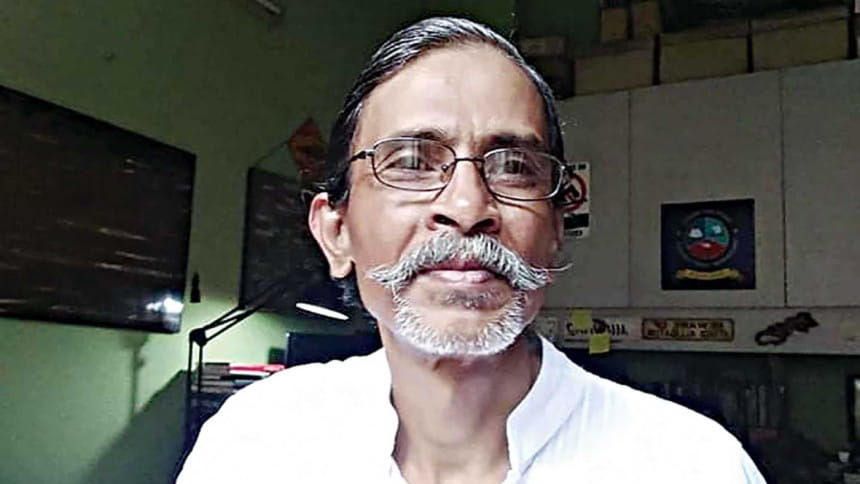DSA took away Mushtaq

Writer Mushtaq Ahmed paid the ultimate price for his freedom of expression, and it's a matter of shame for us all that it happened in the year of the Golden Jubilee of Bangladesh's independence. Ironically, the law that was applied against Mushtaq to accuse him of harming the image of the country for criticising the current state of affairs, the Digital Security Act (DSA), has itself earned global notoriety. Even in the most cautious diplomatic condemnation of the DSA, UN Human Rights High Commissioner Michelle Bachelet termed it an "ill-defined" piece of legislation "used to punish criticism of the government." According to the European Union (EU), "some of its provisions risk going beyond the stated purpose of fighting digital crime."
The defenders of human rights, however, were not so polite in expressing their outrage. Amnesty International said, "The Digital Security Act criminalises many forms of freedom of expression, and imposes heavy fines and prison sentences for (the) legitimate forms of dissent." Another rights group, dedicated wholly to the issue of the freedom of expression, ARTICLE 19, observed in an analysis of the DSA that its "several provisions are in breach of international human rights law." The Human Rights Watch (HRW) termed it "draconian" and called for scrapping it altogether.
Following widespread criticism, the government now accepts that "there have been some abuses of the DSA." Admitting such misapplication of the dreaded act, the law minister told us that the police had been instructed not to arrest journalists under this law, until an investigation was completed and a charge sheet finalised. How problematic the ministerial discretion has been in applying the law has already become clear, as a number of reports suggest the contrary. On February 18, 2022, police in Satkhira arrested Jahurul Haque, a local reporter, for his Facebook status that allegedly defamed a police officer. Another journalist, Azhar Mahmood, was sent to prison earlier this month in the northern district of Rangpur in a DSA case. According to Ain O Salish Kendra (ASK), a national monitoring group of human rights violations, as many as 1,134 cases were lodged last year against journalists and alleged government critics under the DSA, which was manifold higher than the previous years.
The so-called misapplication of the DSA by law enforcement agencies and activists of the ruling party is only one part of the potential hazard of the law. The other part lies with the justice system, where subjects of persecution by the executive branch of the government face almost wholesale denial of their rights to bail. There are several judicial precedents in the subcontinent on the rights of bail, which say this right could not be denied without exceptional guilt and risks, and criticising the government or exercising the right of the citizens to free expression is not a crime. But our trial courts and magistracies refrain from using their judicial discretion on affording bails to those against whom there are no criminal records and whose only offence is criticising or satirising people in power or their acts.
Mushtaq, however, was even more unlucky that he was denied bail by the higher court, too, which issued a rule nisi upon the government, and he died before the expiry of the time given for the government's response.
A year has passed since Mushtaq died under the custody of the state, but many questions remain unanswered. Neither the government, nor the National Human Rights Commission (NHRC) has investigated the allegations of foul play surrounding his case. One of his co-accused, cartoonist Ahmed Kishore, had alleged abduction, torture and being kept incommunicado in some mysterious detention centres for a few days before they were shown arrested, which could easily be classified as Enforced Disappearances. And the alleged perpetrators were members of the Rapid Action Battalion (Rab). The investigation by the Police Bureau of Investigation (PBI), ordered by the trial court, which ruled out any such illegal act, is hardly a credible one as it lacked independence. Similarly, there was no independent investigation into the circumstances of Mushtaq's death, while the official post-mortem report was rejected by most observers as not credible.
Mushtaq was not a political activist and did not belong to any political party. He was a writer and a brave entrepreneur. Like millions of other people on social media, he had simply expressed his views—obviously critical of the government—on various issues and exchanged views with his friends in groups; yet, he became a victim of gross injustice.
Research by Prof Ali Riaz on behalf of the think tank Centre for Governance Studies (CGS) shows that a large number of people implicated in criminal cases under the DSA are activists of the ruling party itself, subjected to harassment by their rivals within the party. Due to the rigid non-bailable provisions of the law and the flexibility of allowing anyone to lodge a complaint without being affected directly or indirectly, the DSA has become a weapon of choice for both the law enforcement agencies and the powerful people.
If we want to avoid any more tragedies like Mushtaq's death in state custody, we need the DSA to be repealed at the earliest. Wasting time in the name of consultation with foreign experts to amend a discredited law serves no good purpose.
Kamal Ahmed is an independent journalist and writes from the UK. His Twitter handle is @ahmedka1

 For all latest news, follow The Daily Star's Google News channel.
For all latest news, follow The Daily Star's Google News channel. 



Comments